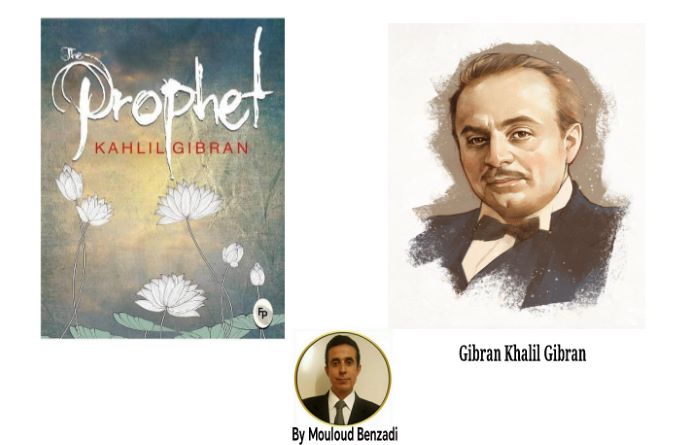BBC once referred to it as the "Bible of the counterculture," emphasizing its status as a timeless classic. "The Prophet" by Arab Diaspora poet Gibran Khalil Gibran was first published over a century ago in 1923. Since then, the book has transcended borders, achieving exceptional success by selling over 100 million copies worldwide (with over 10 million in the United States alone). This remarkable accomplishment prompts questions: Why is this book so significant, and why is Gibran more popular than his Arab counterparts?
Embracing Assimilation and Change
One of the lesser-known facts about Gibran is his openness to change and integration. Khalil Gibran arrived in America in 1895 with his mother Kamila and his siblings, settling initially in Boston's South End within the Lebanese community. The significance of his choices is underscored by WBUR, stating, "He was terribly aware of either completely joining the intellectual community surrounding him in Boston and in New York or just staying with the immigrants. And it's interesting that when he returned to the United States [from a visit to Paris, France], instead of settling in the Syrian community, he brought his sister, Mariana, into Beacon Hill." WBUR further noted, "he did not settle in Little Syria, which meant he was interested in assimilating." When Gibran ventured to New York, he chose to reside in Greenwich Village, forging connections with numerous individuals who introduced him to other literary figures. As WBUR pondered, "Could he have stayed in the Syrian community? Yes, but I don't think he would have become an international figure."
Undoubtedly, Khalil Gibran's capacity to assimilate into American society was pivotal to his success as an Arab intellectual. This assimilation not only facilitated his acceptance within American cultural circles but also played a crucial role in the widespread success of his English book "The Prophet." Through his integration and evolution of thought, Gibran was able to grasp Western ways of thinking, transcend cultural barriers that impeded understanding, and appeal to a broader audience, culminating in global acclaim and recognition for his work.
Gibran’s Bohemian Spirit And Sufi Wisdom
WBUR revealed that Kahlil Gibran "immersed himself in the intellectual bohemianism of the early 20th century."
Bohemianism is a social and cultural movement that originated in Europe in the mid-19th century, characterized by a rejection of traditional conventions and values, and emphasizing spirituality, freedom, and community. This movement played a vital role in the global popularity of Kahlil Gibran's "The Prophet." The book's themes of self-discovery, individuality, and challenging societal norms closely mirrored the Bohemian principles, attracting artists, writers, and free spirits. The values of accepting uniqueness, blending spirituality and creativity, enjoying freedom, and caring about community made a strong bond between "The Prophet" and the Bohemian lifestyle. This connection appealed to many different people looking for inspiration, wisdom, and a more liberated way of life and thought.
In addition to Bohemianism, Sufism had a significant influence on Gibran’s writings. The Sufi influence is evident in deep contemplation, seeking truth, spiritual knowledge, and patience as paths to wisdom and inner peace, all of which are reflected in “The Prophet.” The values of love, kindness, and tolerance towards others that Gibran advocates for are pillars of Sufi philosophy. The fusion of Sufi philosophy and Bohemian principles in “The Prophet” adds great significance to this timeless work, continuing to inspire readers across cultures and generations.
Gibran's Timeless and Poetic Language
The enduring success of Kahlil Gibran’s masterpiece, 'The Prophet,' can be largely attributed to the remarkable use of captivating old-fashioned language that transcends conventional boundaries. While Gibran did not employ archaic English similar to the linguistic styles of Shakespeare or Chaucer, his choice of language does have a poetic and somewhat elevated tone that may evoke a sense of old-fashioned or timeless language. Gibran’s style often blends elements of different literary traditions, including biblical language and Eastern wisdom, giving it a distinctive, somewhat archaic flavor.
One of the defining features of Gibran’s poetic style in 'The Prophet' is his use of imagery and symbolism to convey universal truths and themes. His prose is rich with vivid metaphors and allegorical language that evoke powerful emotions and provoke thought. An example of this can be found in this excerpt: “When love beckons to you, follow him. Though his ways are hard and steep, and when his wings enfold you, yield to him. Though the sword hidden among his pinions may wound you, and when he speaks to you, believe in him, even if his voice may shatter your dreams as the north wind lays waste to the garden. For even as love crowns you, so shall he crucify you.” This passage captures Gibran’s lyrical language and profound reflections on the complexities of love and its transformative power.
The Profound Philosophy of "The Prophet"
One important factor contributing to the timeless success of "The Prophet" by Kahlil Gibran is its profound philosophy and wisdom. It delves deep into the human experience, offering insightful reflections on various aspects of life. For instance, "The Prophet" explores the interconnectedness of joy and sorrow, highlighting how both are essential elements of the human experience. Gibran suggests that true joy can only be understood in contrast to sorrow, asserting that both emotions are necessary for personal growth and resilience. By acknowledging the cyclical nature of joy and sorrow, Gibran encourages readers to embrace life's fluctuations with acceptance and understanding.
In terms of love, "The Prophet" portrays love as a binding force that should not seek to possess but rather to liberate. Gibran emphasizes that love is not about ownership but about mutual respect and freedom. His words on love inspire readers to embrace a love that is unconditional and selfless. Furthermore, "The Prophet" offers a unique perspective on marriage, underscoring the importance of maintaining individuality within the marital union. Gibran suggests that couples should support each other's personal growth while allowing space for individual development. He stresses that marriage should be a partnership grounded in mutual understanding and respect rather than domination or dependence.
The Universal Appeal of "The Prophet"
One significant reason for the global success of "The Prophet" by Kahlil Gibran lies in its universal appeal. Unlike his contemporaries in the Arab world who focused on local themes and nationalism, Gibran's exposure to life in America broadened his perspective to explore universal concepts. Through profound insights on love, joy, sorrow, freedom, and individuality, "The Prophet" transcends cultural boundaries, offering guidance that speaks to the core of the human experience. By delving into these universal themes that echo spiritual and philosophical teachings from various traditions worldwide.
For instance, "The Prophet" explores the theme of death in a profound and comforting way. It offers insights on the soul's journey, the immortality of love, and the interconnectedness of life and death. This philosophical approach appeals to readers seeking wisdom and solace in the face of mortality.
"The Prophet" also delves into the theme of freedom, emphasizing the liberation of the human spirit. Gibran's contemplations on freedom and its connection to responsibility and choice resonate with readers worldwide who seek personal liberation and the freedom to live authentically.
Beyond Religious Affiliations
“The Prophet” by Kahlil Gibran has a unique ability to transcend religious boundaries and touch the hearts of people from diverse backgrounds. Reverend Laurie Sue, an interfaith minister in New York, describes the universal appeal of the book by stating, “But it is not filled with any kind of dogma; it is available to anyone whether they are Jewish or Christian or Muslim.” This sentiment captures the essence of Gibran’s work, which speaks to the universal truths and experiences that resonate with individuals regardless of their religious affiliations. Professor Juan Cole, a historian of the Middle East at the University of Michigan, highlights how Gibran’s writings have provided solace and inspiration to many who may have turned away from the traditional structures of organized religion. He notes, “Many people turned away from the establishment of the Church to Gibran,” emphasizing the power of Gibran’s words to speak directly to individuals seeking a more personal and universal connection to spirituality. Gibran’s ability to transcend specific religious doctrines and speak to the innermost desires and struggles of the human soul has made “The Prophet” a timeless and cherished work for readers around the world. Its message of love, freedom, and spiritual growth resonates with individuals seeking deeper meaning and connection in their lives, regardless of their religious background.
In conclusion, the worldwide recognition of "The Prophet" stems from the author's remarkable talent in reaching beyond geographical boundaries and cultural differences by exploring universal themes, profound philosophical insights, and wise teachings. Another key factor in the success of Gibran's works, including "The Prophet," and their superiority over those of his Arab counterparts, lies in Gibran's adoption of English, the global language. By embracing a Western style of thought and writing in English, Gibran effectively overcame linguistic barriers and cultural obstacles that often impeded the global recognition of translated Arabic works.
Today, over one century since the book was first published, "The Prophet" remains one of the most influential books in history, never out of print since 1923. This milestone has elevated Gibran to the status of the third best-selling poet in history, placing him in the esteemed company of Shakespeare and Lao-tzu.




